Top 10 Best ChatGPT Apps for Medical Students in 2026 (Free + Paid)
AI has transformed medical education through the integration of large language models like ChatGPT into students' learning processes.
Current research indicates that 45.3% of medical students prefer AI-powered learning support over traditional faculty instruction, while 42.2% choose it over textbooks.
These AI assistants serve as effective learning tools, helping students:
- Understand complex medical concepts
- Prepare for board examinations
- Organize study materials efficiently
- Support learning across disciplines, from basic sciences to clinical rotations
This guide evaluates the top 10 AI learning applications available to medical students in 2026, analyzing their features and benefits to help you select the most appropriate tool for your educational needs.
So let’s get started-
Which Chatbot is Best for Medical Students?
Elephas stands out as the best chatbot app for medical students, thanks to its powerful features tailored to their needs. With offline access, a notes feature, web search functionality, and the ability to build a comprehensive knowledge base, Elephas supports students in efficiently managing their learning materials.
Best ChatGPT App for Medical Students at a Glance
Elephas: Research and knowledge management on rotations
ChatLabs: Exam prep (MCAT, USMLE, UCAT)
Brainscape: Flashcards and spaced repetition for exams
UPDF: Document annotation and interaction
MDCalc: Quick, evidence-based clinical decisions
GeekyMedics: OSCE prep and clinical skills improvement
Medscape: Medical news and clinical reference
TeachMeAnatomy: Visual learning for anatomy mastery
VisualDX: Diagnostic support with visual aids
Epocrates: Drug information and clinical guidelines
Top 10 Best ChatGPT App for Medical Students in 2026
App Name | Best For | Pricing |
Elephas | Research and knowledge management on rotations | Starts free then $8.99/month |
ChatLabs | Exam prep (MCAT, USMLE, UCAT) | $29.99/month |
Brainscape | Flashcards and spaced repetition for exams | $19.99/month |
UPDF | Document annotation and interaction | $39.99/year |
MDCalc | Quick, evidence-based clinical decisions | Free |
Geeky Medics | OSCE prep and clinical skills improvement | $19/month |
Medscape | Medical news and clinical reference | Free |
TeachMe Anatomy | Visual learning for anatomy mastery | $8/month |
VisualDX | Diagnostic support with visual aids | $20.75/month |
Epocrates | Drug information and clinical guidelines | $179.99/year |
1. Elephas
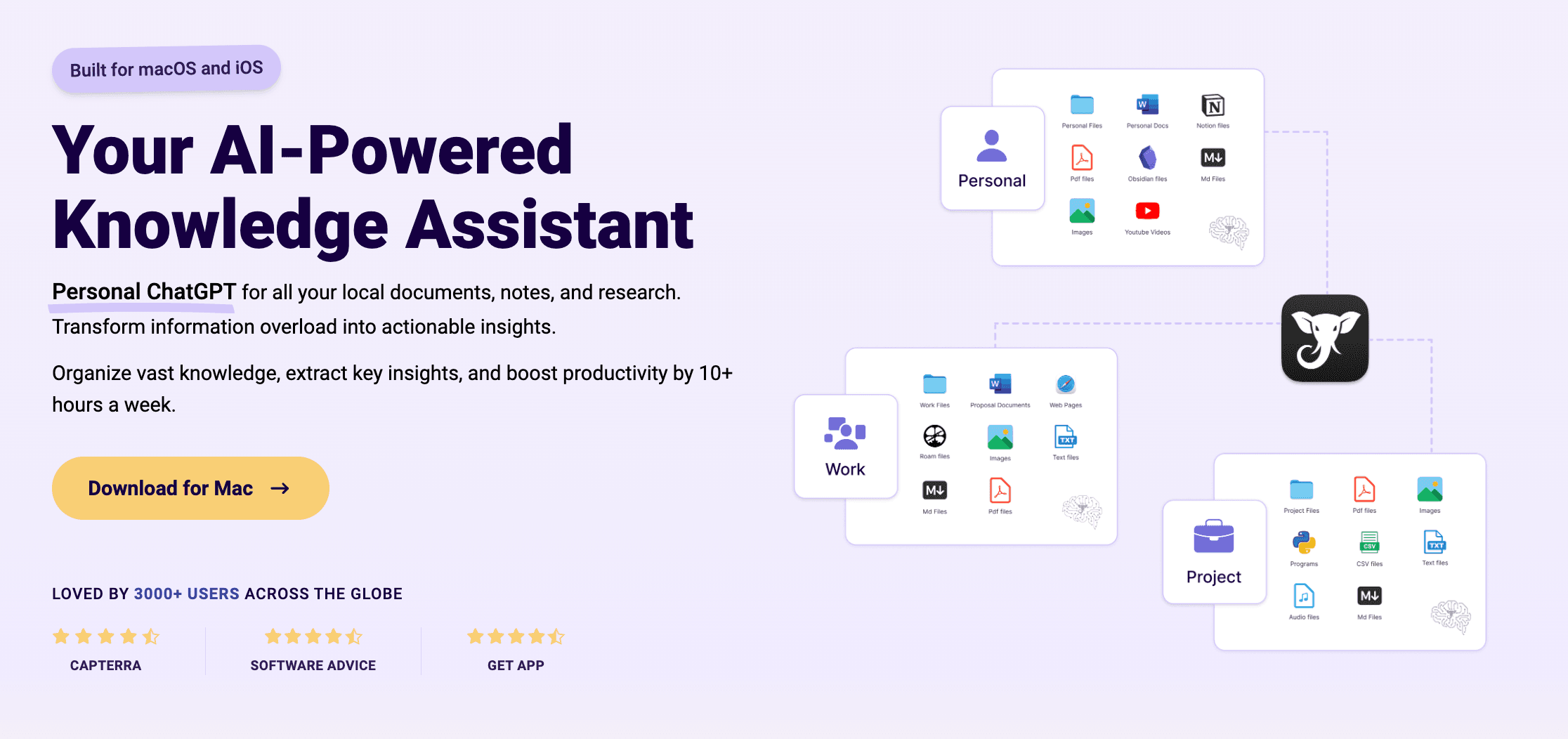
Best for: Streamlining medical research and knowledge management
Elephas is a powerful knowledge assistant that helps medical students to efficiently manage their learning materials and streamline their research processes. With its intuitive interface and robust features, including offline availability, a built-in notes feature, and web search capabilities, Elephas simplifies the way students organize and access information.
The tool's offline functionality ensures that students can access their knowledge base anytime, anywhere, without relying on an internet connection. This is particularly beneficial for students studying in remote areas or during commutes.
The integrated notes feature allows students to quickly jot down ideas, thoughts, and insights, keeping all their information centralized and easily accessible.
Best Features:
Offline Availability: Access your knowledge base and work on your research without an internet connection, ensuring uninterrupted learning and productivity.
Notes Feature: Easily capture and organize your thoughts, ideas, and insights within the Elephas platform, keeping all your information in one convenient location.
Web Search: Seamlessly search the web for relevant information directly within Elephas, saving time and effort in your research process.
Super Brain: Build a comprehensive knowledge base by integrating various file formats, including PDF, CSV, JSON, and other popular document types, allowing for a more diverse and interconnected learning experience.
Auto-sync: Keep your knowledge base up-to-date across all your devices with the automatic synchronisation feature, ensuring you always have access to the latest information.
Pricing: Free Plan + $8.99/month
Use case:
Medical students preparing for their neurology rotation can leverage Elephas to create a centralized knowledge base containing lecture notes, research papers, and relevant web articles. The offline availability ensures that they can access this information during hospital rounds or in areas with limited internet connectivity.
By using the notes feature to capture key insights during patient interactions and the web search functionality to quickly find relevant case studies, students can efficiently expand their understanding of neurological conditions and treatments.
2. ChatLabs
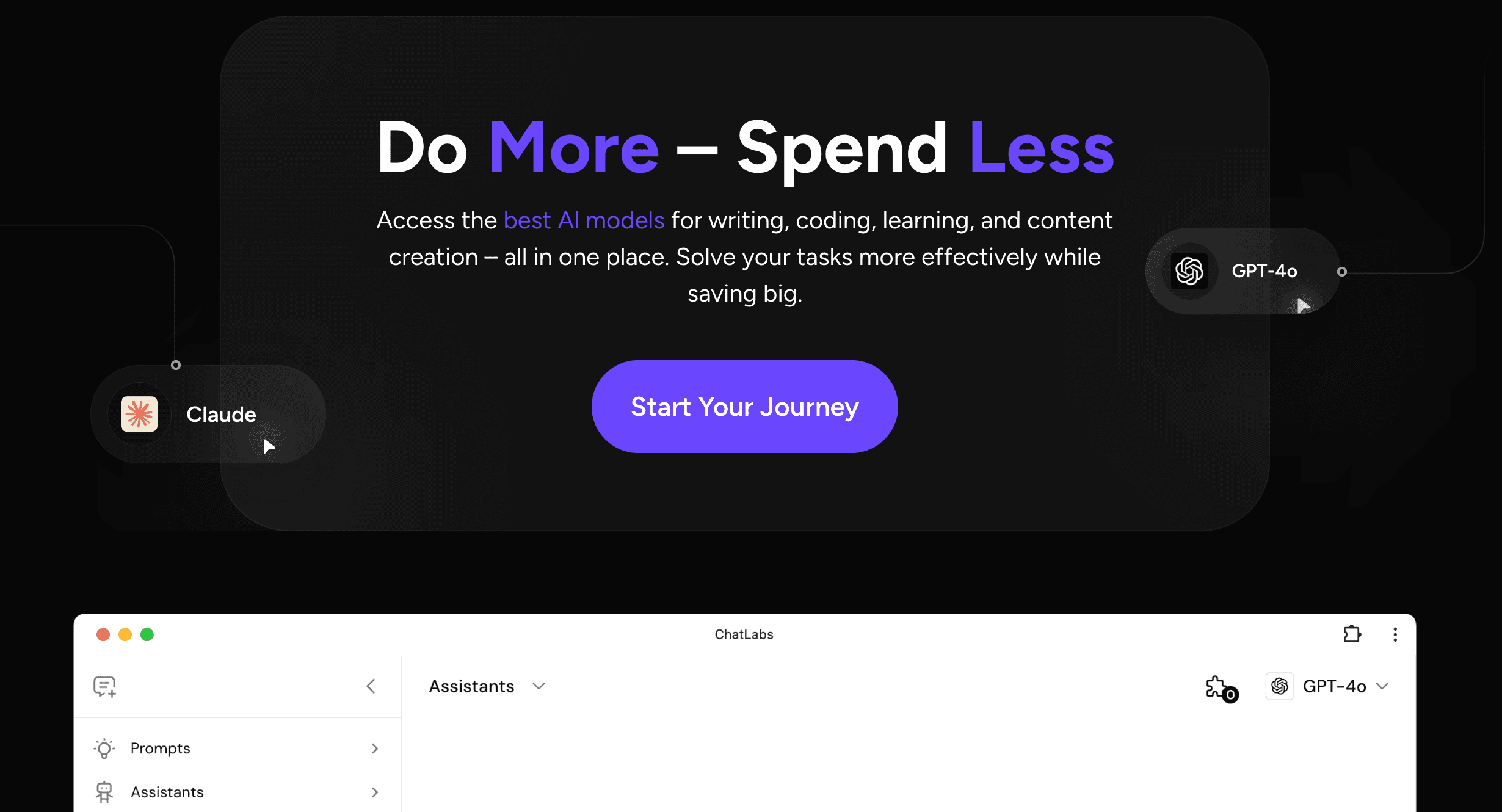
Best for: Helping medical students master complex topics and ace exams
ChatLabs from WritingMate is a game-changing AI tool that simplifies the way medical students study. With its user-friendly interface and powerful features, ChatLabs helps students prepare for exams, understand complex topics, and find the best study resources.
Whether you're studying for the MCAT, USMLE, or UCAT, ChatLabs is the perfect companion to help you succeed in your medical education journey. It provides a comprehensive suite of tools designed to streamline your learning process, allowing you to focus on what matters most: mastering the material and becoming a skilled healthcare professional.
Best Features:
Exam Preparation: ChatLabs provides practice questions, explains difficult concepts, and offers instant feedback to help students prepare for the MCAT, USMLE, and UCAT exams.
Summarization and Explanation: ChatLabs can summarize lengthy articles, PDF files, textbooks, and video lectures, making it easier for students to grasp key information. It also simplifies complex topics with easy-to-understand explanations.
Resource Discovery: With its Web Search plugin, ChatLabs guides students to the most relevant and high-quality study materials, ensuring access to accurate and up-to-date information.
Pricing: $29.99/month
Use case:
ChatLabs can be a lifesaver for medical students struggling to understand complex pathophysiology concepts. It can break down intricate disease processes into easy-to-grasp explanations, helping students master the material more effectively.
3. Brainscape

Best for: Accelerating medical learning through smart flashcards
Brainscape is a powerful web and mobile-based platform that revolutionizes the way medical students learn and retain vast amounts of information. With its extensive library of colour-coded flashcards covering various medical subjects, Brainscape makes it easy for students to study and master complex concepts efficiently.
The app's intelligent spaced repetition algorithm ensures that harder concepts are repeated at optimal intervals, helping students remember information more effectively. By adapting to each student's learning pace and needs, Brainscape maximizes the efficiency of study sessions, making it the perfect tool for busy medical students looking to make the most of their limited time.
Best Features:
Comprehensive flashcard library: Access hundreds of color-coded flashcards covering anatomy, body systems, medical exams, pharmacology, and more.
Spaced repetition technology: Brainscape's algorithm optimizes the timing of flashcard repetition based on each student's performance, ensuring effective retention of challenging concepts.
Expert-curated content: Flashcards are created by top educators and students, ensuring high-quality, accurate, and relevant information for various medical subjects and exams, such as EMT, MCAT, NCLEX, and USMLE.
Pricing: $19.99/month
Usecase
Medical students preparing for the USMLE Step 1 exam can leverage Brainscape's expert-curated flashcards to master the vast amount of information required. The app's spaced repetition algorithm ensures that students focus on the most challenging concepts, gradually building mastery over time.
4. UPDF
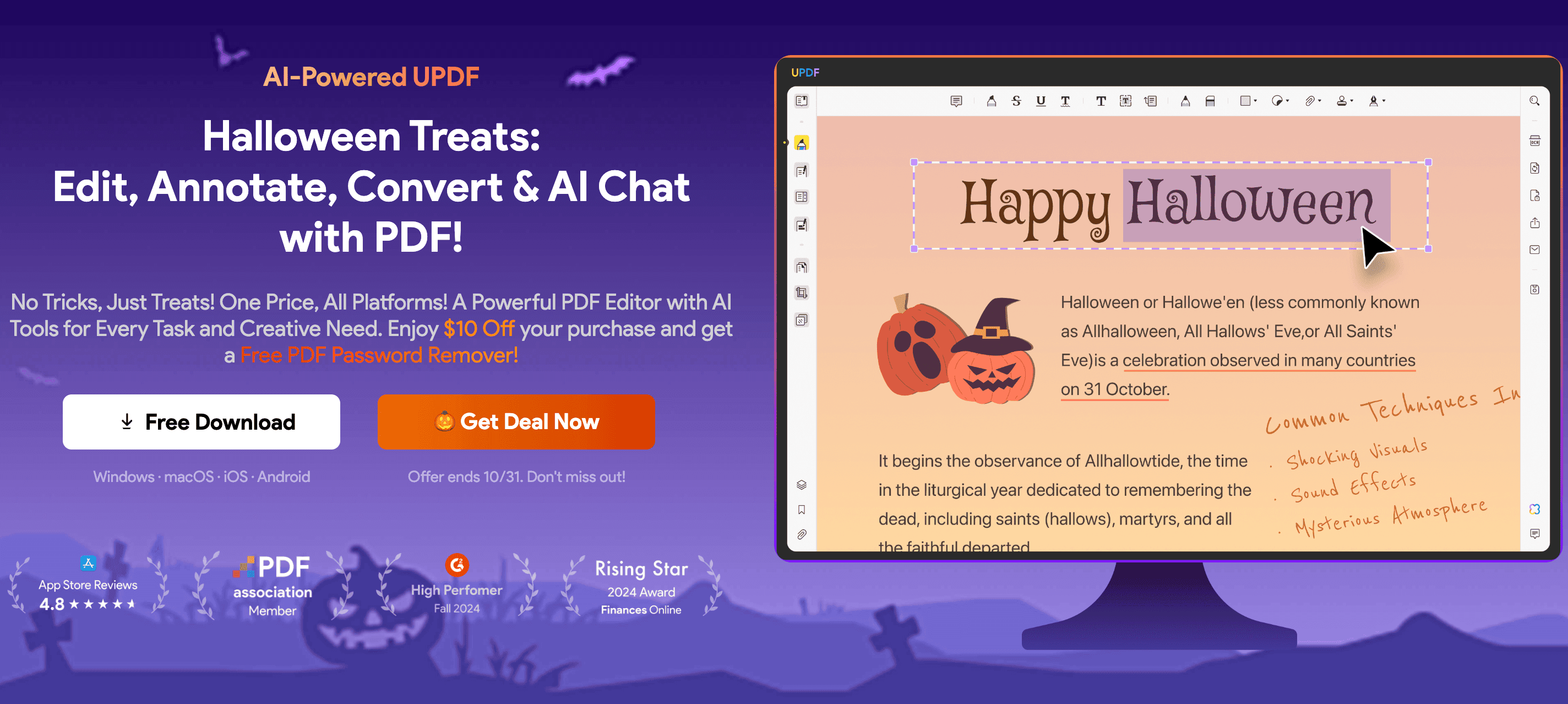
Best for: Enhancing medical document comprehension and interaction
UPDF is a cutting-edge, AI-powered PDF reader, editor, annotator, and note-taking tool that revolutionizes the way medical students interact with their study materials. Available on both desktop and mobile platforms, UPDF provides an intuitive and efficient way to read, annotate, summarize, explain, and translate medical documents.
One of UPDF's standout features is its AI chatbot, UPDF AI, which allows students to engage with their documents in an unprecedented manner. When faced with a lengthy medical research paper, students can use UPDF AI to quickly generate summaries, clarify complex terminology, and even translate the content into their preferred language.
Best Features:
AI-powered document interaction: UPDF AI chatbot provides instant summaries, explanations, and translations, making complex medical content more accessible and easier to comprehend.
Versatile annotation tools: Highlight, underline, mark, draw, or insert notes, stickers, and stamps to engage with and personalize your medical documents.
OCR technology: Convert scanned documents into editable PDFs, enabling you to work with a wider range of medical resources efficiently.
Pricing: $39.99/Year
Use case
Medical students often struggle to keep up with the vast amount of reading material they encounter during their studies. With UPDF, they can quickly summarize lengthy research papers, clarify complex medical terminology, and even translate foreign language articles.
5. MDCalc Medical Calculator
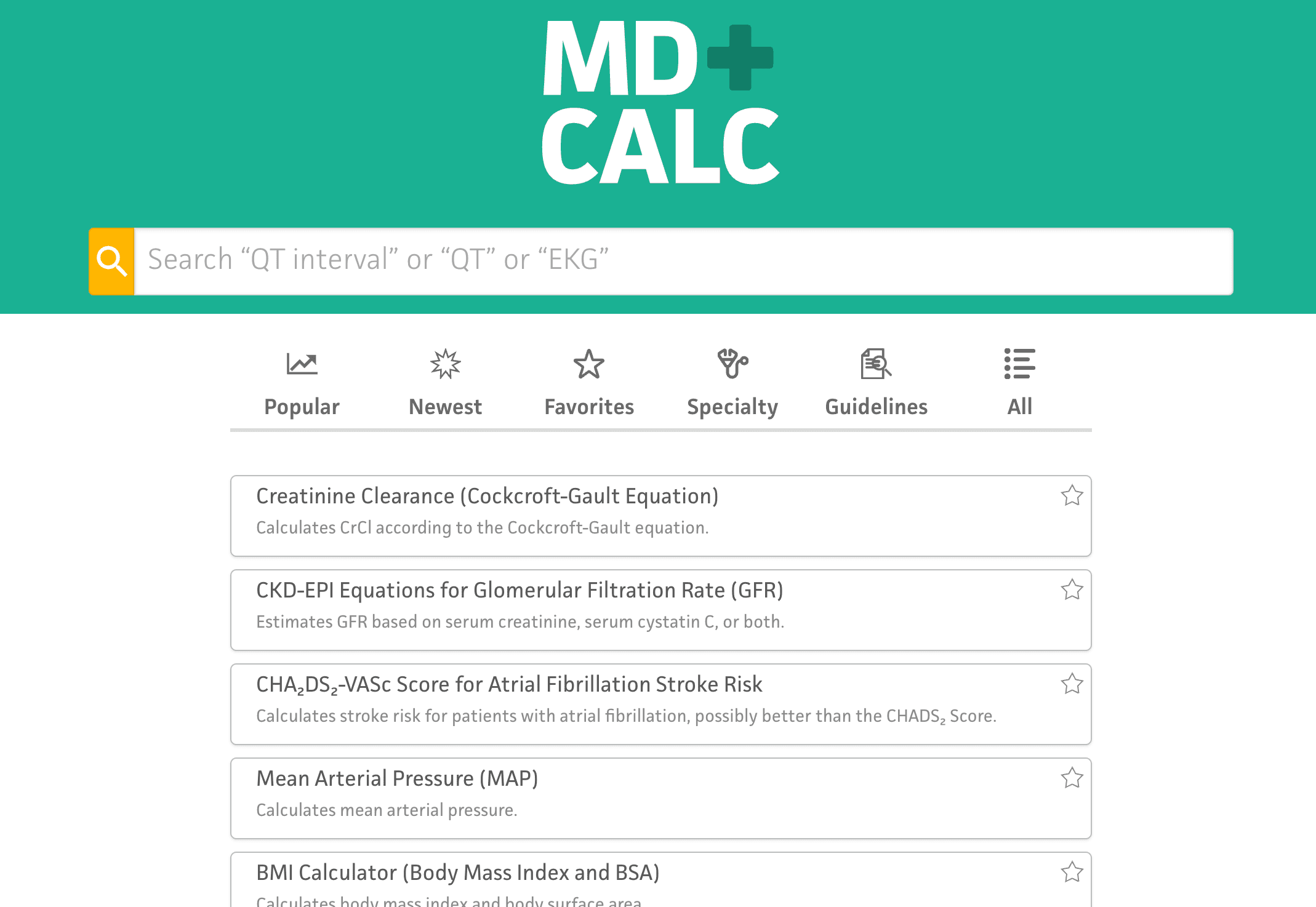
Best for: Simplifying clinical decision-making with evidence-based tools
MDCalc medical calculator is an indispensable app for medical students and professionals alike, streamlining the process of making complex medical calculations and assessments. With a user-friendly interface and a powerful search engine, MDCalc puts a wealth of clinical decision-making tools at your fingertips.
Covering more than 35 medical specialities, MDCalc offers over 550 evidence-based clinical decision tools, including risk scores, classifications, formulas, equations, and dosing calculators. By ensuring that the latest and best evidence is used, MDCalc empowers medical students to make informed decisions and provide optimal patient care.
Best Features:
Comprehensive library: Access 550+ clinical decision tools across 35+ medical specialities, ensuring a wide range of evidence-based resources for various situations.
User-friendly search: Easily navigate through the vast collection of tools using MDCalc's intuitive "Google-like" search function, saving time and effort.
Up-to-date information: Stay informed about the most popular and newest calculations, ensuring you're always working with the most current evidence and best practices.
Pricing: Free
Use case
Medical students on clinical rotations can rely on MDCalc to quickly access the appropriate clinical decision tools for each patient case. For example, when assessing a patient's risk of venous thromboembolism, students can use MDCalc to calculate the Wells score, guiding them in making evidence-based decisions about diagnostic testing and treatment. By incorporating MDCalc into their daily practice, students can enhance their clinical reasoning skills and provide better patient care.
6. Geeky Medics
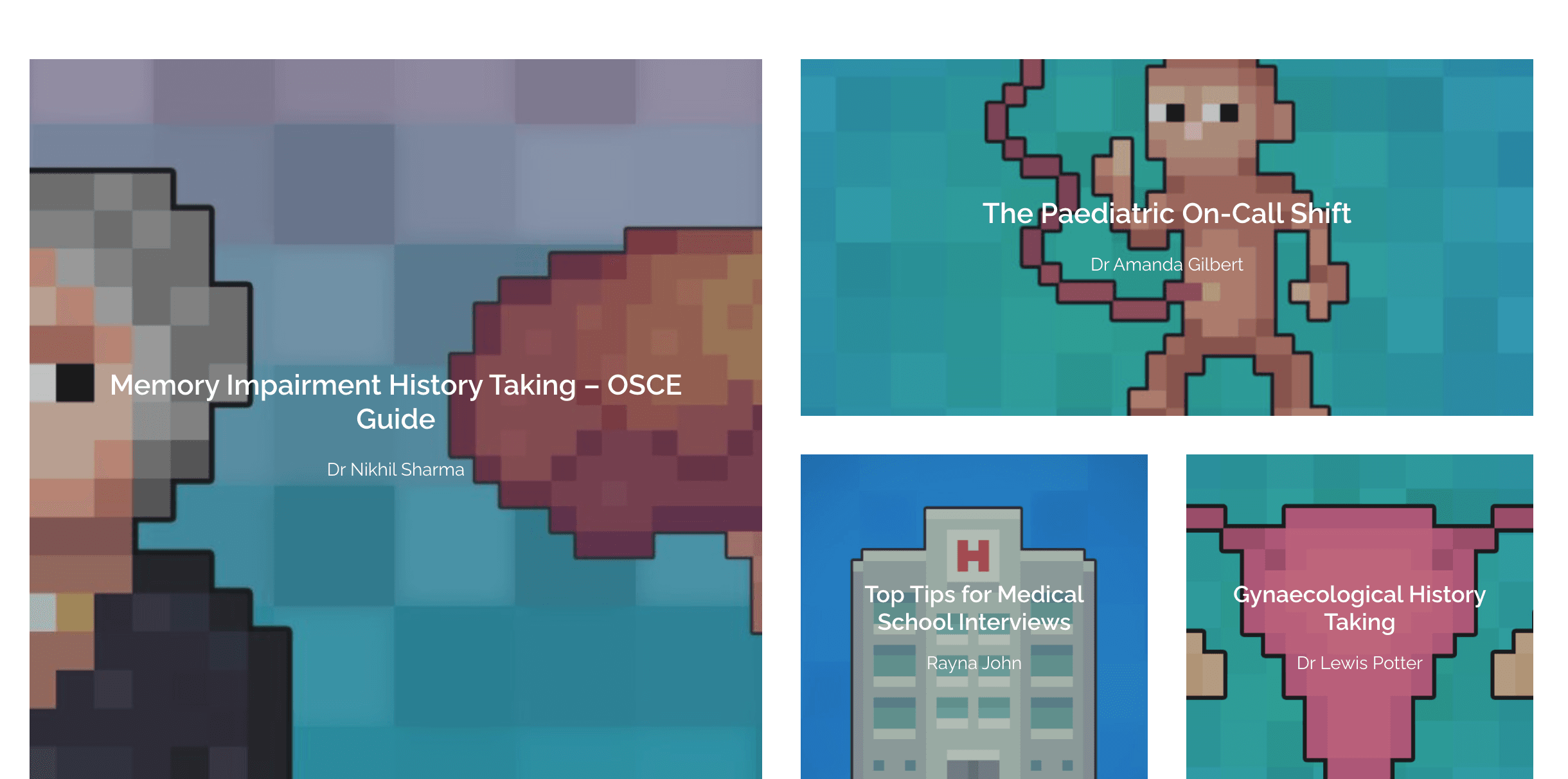
Best for: Enhancing clinical skills through comprehensive OSCE guides and resources
Geeky Medics is a comprehensive medical education platform designed to help students improve their clinical knowledge and skills. With an extensive collection of OSCE guides covering a wide range of medical specialties and topics, Geeky Medics provides a one-stop resource for students looking to excel in their clinical assessments.
The platform offers video demonstrations, interactive checklists, and customizable timer functionality, enabling students to practice and perfect their clinical skills at their own pace. By providing a wealth of high-quality, easily accessible resources.
Best Features:
Comprehensive OSCE guide library: Access 1300+ OSCE stations covering various medical specialties, including cardiovascular, respiratory, neurology, obstetrics & gynaecology, and more.
Video demonstrations: Learn clinical skills through detailed video demonstrations, making it easier to understand and practice complex procedures.
Customizable checklists and timers: Test your knowledge and track your progress using built-in checklist mark schemes and adjustable timer functionality.
Pricing: $19/month
Use case:
Medical students preparing for their clinical rotations can turn to Geeky Medics' extensive library of OSCE guides to familiarize themselves with the essential skills and procedures they'll need to master. By watching video demonstrations and practising with the platform's interactive checklists and timers, students can build their confidence and proficiency in a wide range of clinical scenarios, ultimately leading to better performance on the wards and in their OSCEs.
7. Medscape
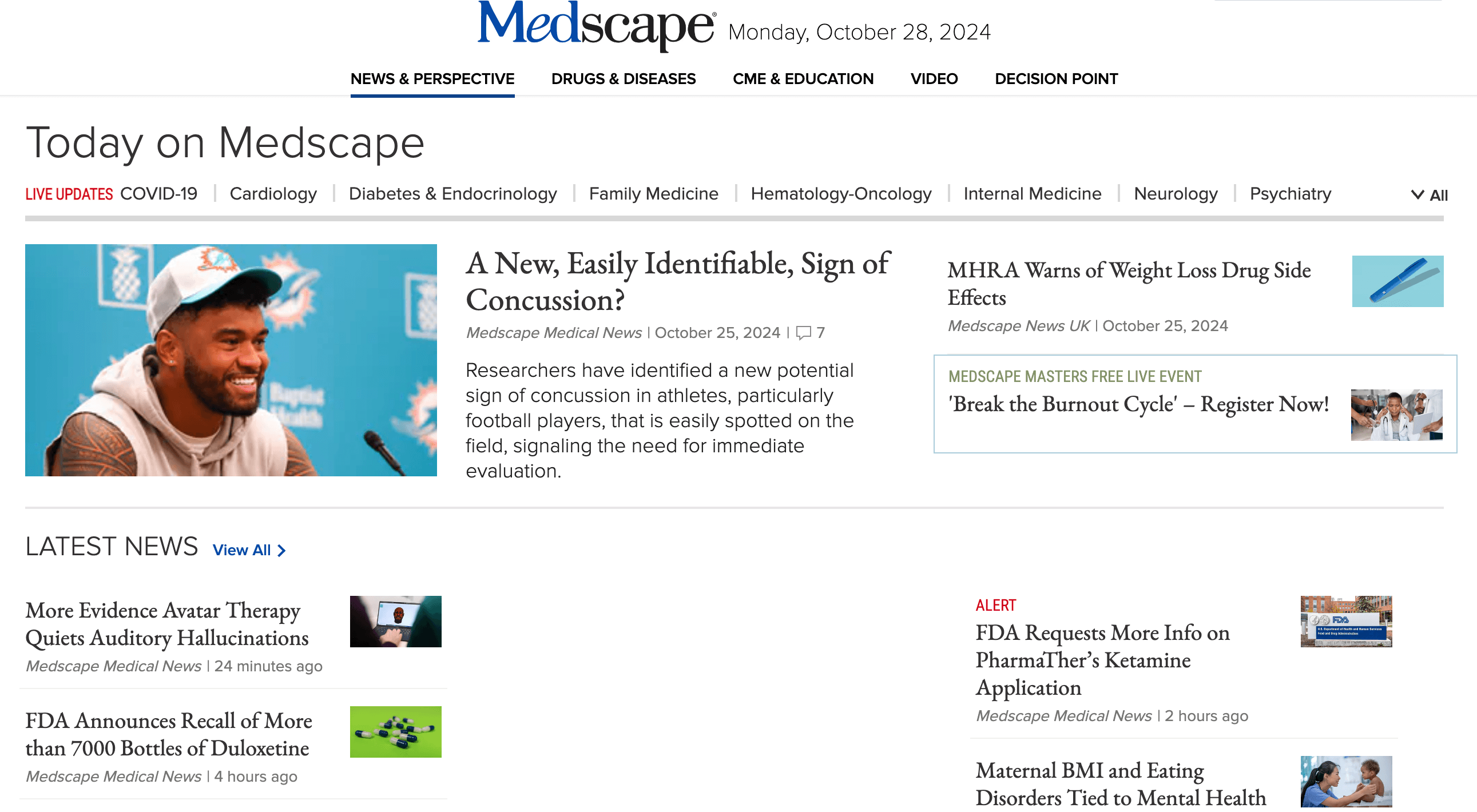
Best for: Providing comprehensive medical news, education, and clinical resources
Medscape is an indispensable tool for medical students, serving as a one-stop platform for accessing a wide array of essential resources. The app offers a centralized hub where students can stay up-to-datewith the latest medical news, research, and industry developments, ensuring they remain well-informed throughout their educational journey.
In addition to its news coverage, Medscape provides a robust set of clinical reference tools and drug information, empowering students to make informed decisions and enhance their understanding of various medical concepts. The app's extensive library of CME courses allows students to expand their knowledge and skills, while the personalized CME tracker helps them monitor their progress and stay on top of their continuing education requirements.
Best Features:
Timely medical news and updates: Stay informed about FDA approvals, essential drugs, diseases, and advancements in the medical industry.
Comprehensive clinical resources: Access a wide range of reference tools and drug information to support clinical decision-making and deepen understanding of medical concepts.
Extensive CME offerings: Engage in continuing medical education courses to expand knowledge and skills, with a personalized CME tracker to monitor progress.
Pricing: Free
Use case:
Third-year medical students going on their clinical rotations can rely on Medscape to quickly access relevant drug information and clinical reference tools at the point of care. The app's breaking medical news and research updates help students stay current with the latest developments in their chosen specialities, while the CME courses offer opportunities to deepen their understanding of specific topics and build their professional skills.
8. TeachMe Anatomy app
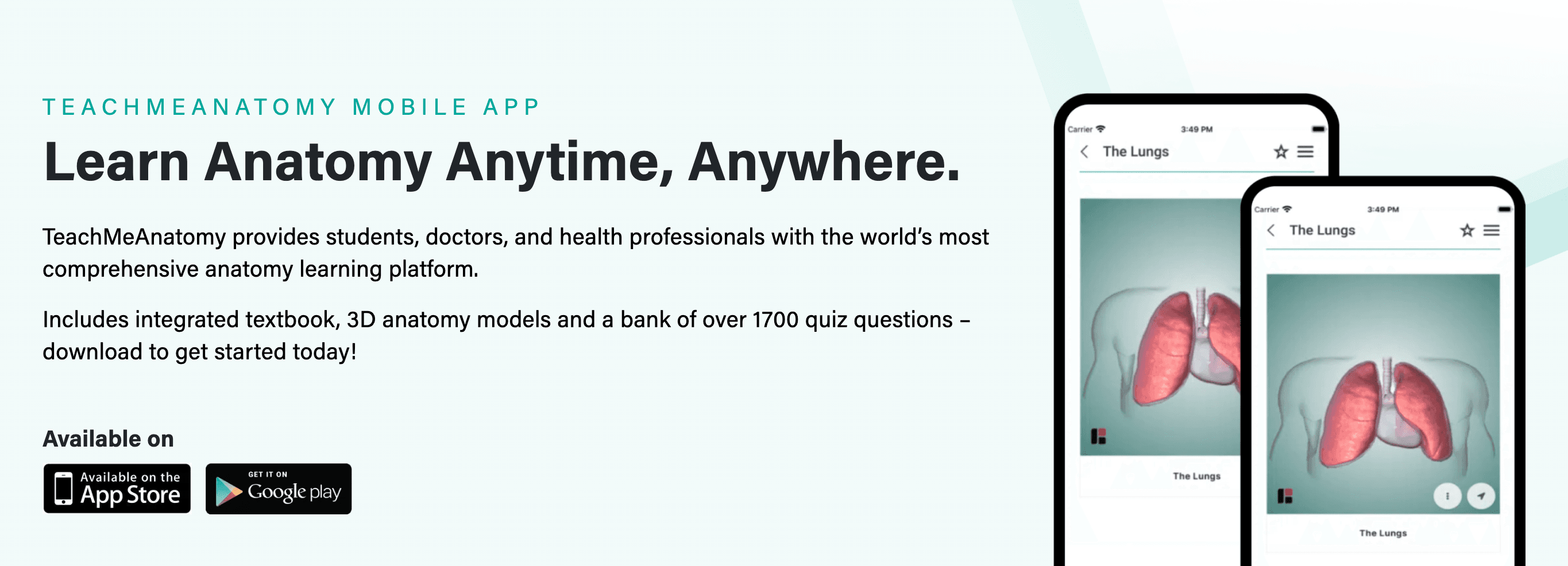
Best for: Mastering anatomy with a comprehensive learning resource
TeachMe Anatomy is a feature-rich app that empowers medical students to learn and master anatomy effectively. With its extensive encyclopedia of illustrations, clinical images, and 3D anatomy models, the app provides a visually engaging and interactive learning experience.
The platform offers over 400 comprehensive articles covering regional and systemic anatomy, ensuring that students have access to a wealth of knowledge at their fingertips. Additionally, TeachMe Anatomy boasts a bank of more than 1,700 quiz questions, allowing students to test their understanding and reinforce their learning.
Best Features:
Colour-rich encyclopedia: Access a vast collection of illustrations and clinical images to enhance your understanding of anatomical structures and their relationships.
3D anatomy models: Explore interactive 3D models that bring anatomy to life, helping you visualize and grasp complex concepts more easily.
Comprehensive articles: Dive deep into over 400 articles covering regional and systemic anatomy, ensuring a thorough understanding of the subject matter.
Pricing: $8/month
Use case:
TeachMe Anatomy can be an invaluable resource for medical students preparing for their anatomy practical exams. The app's 3D models and illustrations can help students visualize structures and their relationships, while the extensive quiz bank allows them to test their knowledge and identify areas for improvement.
9. VisualDX

Best for: Enhancing diagnostic accuracy through visual clinical decision support
VisualDx is a cutting-edge diagnostic clinical decision support system that empowers medical professionals to tackle challenging diagnoses with confidence. By providing access to a comprehensive, curated medical image library, VisualDx enables users to visualize and compare variations of diseases across diverse patient populations.
The platform offers a wealth of features designed to support accurate differential diagnosis, testing, and therapeutic decision-making. With its intuitive interface and powerful search capabilities, VisualDx streamlines the diagnostic process, ensuring that healthcare providers have the information they need at their fingertips.
Best Features:
Comprehensive medical image library: Access a vast collection of high-quality images showcasing disease variations across all skin types, including a dedicated dark skin atlas.
Differential diagnosis support: Utilize the platform's advanced tools to generate and refine differential diagnoses, ensuring accurate identification of even the most complex cases.
Evidence-based recommendations: Benefit from up-to-date, evidence-based guidance on testing and treatment options, empowering confident clinical decision-making.
Pricing: $20.75/month
Use case
VisualDx can be a game-changer for primary care physicians faced with perplexing dermatological presentations. By leveraging the platform's extensive image library and diagnostic support tools, clinicians can quickly narrow down potential diagnoses, order appropriate tests, and initiate targeted treatments, ultimately improving patient outcomes and reducing unnecessary referrals to specialists.
10. Epocrates App
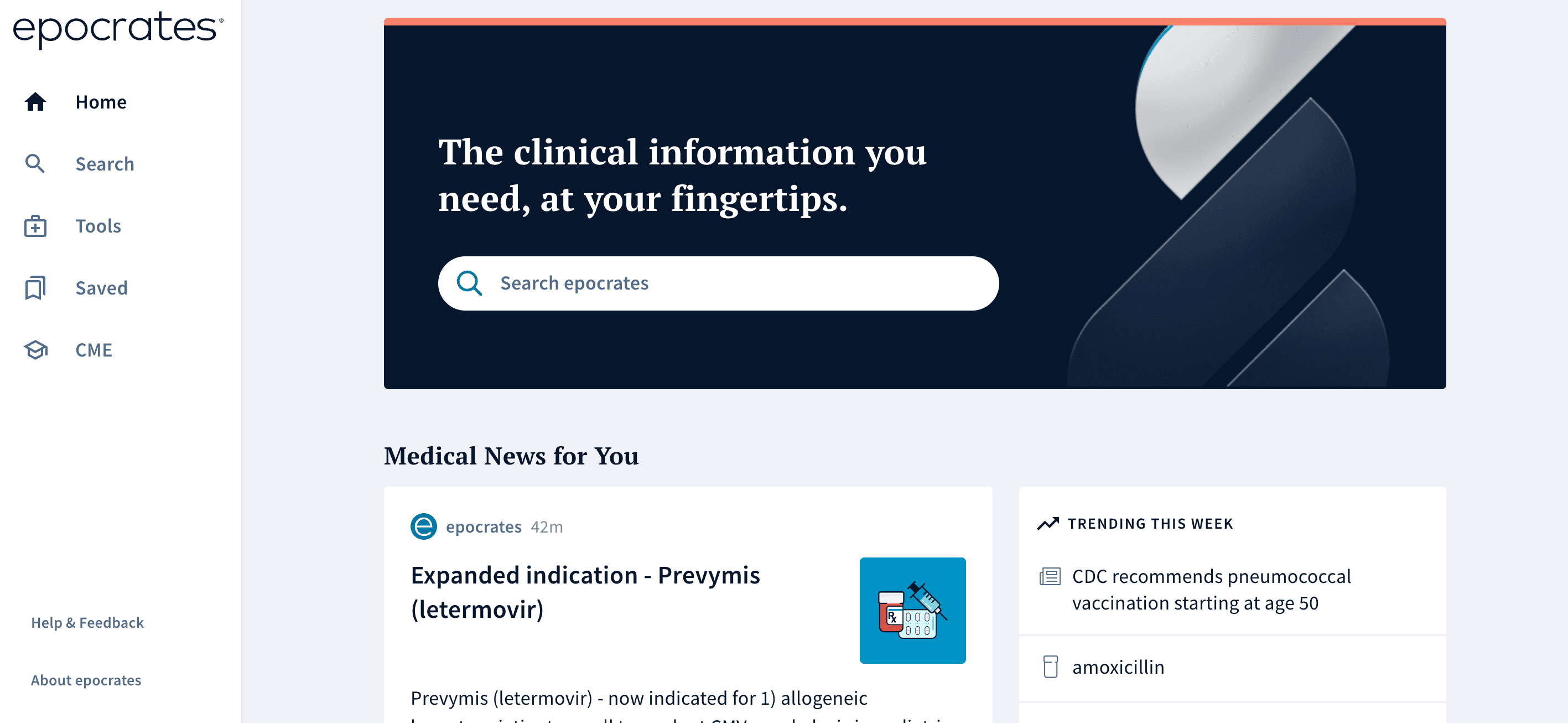
Best for: Making informed clinical decisions on the go
Epocrates is a comprehensive medical reference app that helps healthcare professionals make informed decisions at the point of care. With its extensive library of clinical guidelines, speciality topic alerts, and over 600 dosing calculators, medical equations, and tools, Epocrates provides clinicians with the essential information they need to deliver high-quality patient care.
The app's robust drug database allows users to review prescribing and safety information for thousands of brand, generic, and over-the-counter medications. Epocrates also enables clinicians to check for potentially harmful drug interactions between up to 30 different medications simultaneously, ensuring patient safety and reducing the risk of adverse events.
Best Features:
Comprehensive drug information: Access prescribing and safety information for a vast array of brand, generic, and OTC medications.
Drug interaction checker: Identify potentially harmful interactions between up to 30 drugs at a time, including brand, generic, OTC, and alternative medications.
Pill identification: Easily identify pills based on their imprint or physical characteristics, saving time and reducing errors.
Pricing: $179.99/Yearly
Use case
Busy primary care physicians can rely on Epocrates to quickly access the most up-to-date clinical guidelines and drug information during patient consultations. The app's drug interaction checker helps doctors ensure that their patients' medication regimens are safe and effective, while the pill identification feature allows them to quickly confirm the identity of unfamiliar medications.
Why Do You Need the Best ChatGPT App for Medical Students?
As a medical student, you face the daunting task of absorbing and retaining an immense amount of complex information. The best ChatGPT apps for medical students can be a game-changer in this regard, providing you with powerful tools to streamline your learning process, enhance your understanding of critical concepts, and ultimately help you excel in your studies.
By leveraging these best ChatGPT apps for medical students, you can:
Quickly grasp complex medical concepts through interactive explanations and simplified language
Efficiently prepare for crucial exams like the MCAT, USMLE, or UCAT with personalized study plans and targeted practice questions
Stay organized and up-to-date with your learning materials by easily summarizing lengthy textbooks, articles, and lecture notes
Engage in realistic clinical simulations to develop your diagnostic and treatment skills in a risk-free environment
Access a wealth of expert-curated content, including flashcards, case studies, and question banks, to supplement your learning
Collaborate with peers and mentors through shared knowledge bases and interactive discussions
Save valuable time by streamlining your research process and quickly finding relevant information from reliable sources
How Did We Create the List of the Best ChatGPT Apps for Medical Students?
To create our list of the best ChatGPT apps for medical students, we conducted a thorough evaluation process considering several key factors essential for enhancing medical education. The essential factors included:
Exam preparation capabilities: Personalized study plans, targeted practice questions, and detailed performance analytics.
Organizational tools: Seamless note-taking, summarization, and knowledge base creation features.
Quality of content: Expert-curated material, including flashcards, case studies, and question banks.
Collaboration and community features: Shared knowledge bases and interactive discussion forums.
User experience and interface: Intuitive, user-friendly interface for easy navigation and access to features.
Accessibility and offline functionality: Apps that offer offline access to content and features for uninterrupted learning.
Customization and adaptability: Ability to tailor the learning experience to individual needs and preferences.
How Should You Select the Best ChatGPT App for Medical Students
When selecting the best ChatGPT app for medical students, it's essential to consider your individual learning needs and preferences. While our list provides a great starting point, you may find that certain apps align better with your specific goals and studying style.
To help you make an informed decision, here are some key factors to keep in mind:
Identify your learning gaps: Reflect on the areas where you need the most support, such as understanding complex concepts, preparing for exams, or managing study materials.
Evaluate the app's specialization: Some apps focus more on specific aspects of medical education, such as anatomy or pharmacology. Choose an app that aligns with your current learning priorities.
Consider your learning style: Look for apps that cater to your preferred learning method, whether it's visual, auditory, or interactive.
Assess the app's user interface: Ensure that the app has an intuitive and user-friendly design, making it easy for you to navigate and access the features you need.
Read user reviews: Gain insights from other medical students who have used the app, paying attention to their experiences, successes, and challenges.
Take advantage of free trials: Many apps offer free trials or limited access to features, allowing you to test the app before committing to a subscription or purchase.
Evaluate the app's updates and support: Choose an app that regularly updates its content and features based on user feedback and advancements in medical education.
How Students can Prepare for MCAT, USMLE, and UCAT Exams using Elephas
Preparing for medical entrance exam such as the MCAT, USMLE, or UCAT can be tough. Elephas can be your reliable study companion through these challenging exams.
Here's how you can use Elephas to boost your exam preparation:
Smart Organization and Learning
Store exam-specific materials like MCAT practice tests, USMLE First Aid notes, and UCAT question banks in Elephas's Super Brain feature
Quiz yourself on topics from any section - whether it's MCAT Biology, USMLE Pathology, or UCAT Decision Making
Organize subject-wise materials for systematic review of high-yield topics
Exam-Specific Study Support
Convert USMLE lecture recordings into searchable text notes
Access your MCAT study guides offline during commutes or library sessions
Quick web searches for UCAT strategies and explanation of complex USMLE concepts
Extra Prep Assistance
Create custom summaries for dense MCAT Science topics
Generate practice questions for USMLE clinical scenarios
Get help drafting study schedules and organizing revision timetables
The beauty of Elephas is its flexibility across different medical entrance exams. Whether you're tackling MCAT Physics passages, memorizing USMLE Step 1 pathways, or practicing UCAT Abstract Reasoning patterns, the app adapts to your specific exam needs.
Remember, while Elephas is great for organizing and understanding your exam content, success still depends on consistent practice and dedicated study. Use it as your study enhancement tool alongside your core preparation strategy.
Is ChatGPT useful for Medical Students?
ChatGPT can be a valuable resource for medical students, providing quick access to information and assisting with various tasks such as summarizing articles, explaining complex topics, and generating study materials. However, students should always verify the information with reliable sources and consult with their instructors.
Which AI is Best for a Medical Student?
Elephas is an ideal AI tool for medical students, offering a comprehensive suite of features to streamline research and knowledge management. With offline availability, a built-in notes feature, and web search capabilities, Elephas empowers students to efficiently organize and access information, enhancing their learning experience.
What is the Best Medical GPT?
The best medical GPT is the one you build for yourself, from your own knowledge base. That's where something like Elephas can help massively.
While various AI tools cater to medical students, Elephas and ChatLabs are among the best. Elephas excels in knowledge management and research, while ChatLabs offers exam preparation, concept explanations, and resource discovery. Ultimately, the best choice depends on the student's specific needs and preferences.
Conclusion
Elephas stands out as the undisputed best ChatGPT app for medical students in 2026.
If you're finding it challenging to choose from the vast array of AI medical assistants, Elephas is your safest bet—it seamlessly integrates into your medical studies, whether you're diving into anatomy textbooks, preparing for clinical rotations, or organizing research papers.
There are a few scenarios where you might want to explore alternatives to Elephas: budget considerations and specific feature needs.
If Elephas's $8.99/month subscription feels steep, apps like MDCalc (free) could provide more budget-friendly alternatives while still delivering valuable medical education tools.
If you're seeking specialized features that Elephas doesn't focus on, like OSCE preparation or diagnostic visualization, you might want to explore Geeky Medics or VisualDX for those specific needs.
But here's the key takeaway: if want the best chatGPT app for medical students that combines powerful features with user-friendly design, plus offline capabilities and adaptable AI models, Elephas is the clear choice.
However, every medical student's needs are different.
Consider taking advantage of free trials offered by various apps on our list, such as Elephas' free version. You might discover that one perfectly aligns with your learning style, study habits, or specific medical speciality interests.

Comments
Your comment has been submitted